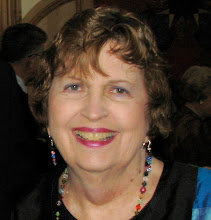The anguish of Eveln's grief is always there, closely entwined with her faith that struggles and finally sustains her.
Cradle Song
Wooden manger
May a stranger
Kneel before you
And adore you?
Dear God-Baby,
I thought maybe
If I cuddled
You, my muddled
Brain could sever
Grief, the lever
Of each doubting
Angel's shouting.
Little One, wise
Christ-Child, will eyes,
Blind with sorrow,
See tomorrow?

Today's common use of free verse has its own beauty, as anything free does, but this strict form (four syllables, rhyming couplets) is an example of much of Evelyn's writing. Many of her manuscripts are class assignments requiring the use of particular forms, giving the students familiarity with each of them.
ReplyDeleteI think that the strict constraints of form takes the poet out of our conscious thought, out of our literal comfort zone, relinquishing control to our subconscious, which in its secret world of our deepest truths searches for sets of words that fit the form and make sense. Evelyn's deepest truths were of God and of grief, grief over the loves she lost and the loves from which she was restrained by a heart that was, as muscles and pump, imperfect.
Will she live tomorrow? How blessed were all of us that she would, and that she would write, and save her poetry, and become enough a mystery to you that you would share her with us, and we would be reminded, and we would re-member her, bring her back to life in ourselves through what she wrote, give her tomorrows as she brightens and deepens ours!